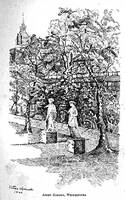The Little Cloister has been greatly altered since then, having been refashioned in the early part of the eighteenth century under the influence of Wren. Although so changed since the time when strange decoctions of medicinal herbs were administered within its walls, it has retained much of its fascination, and the approach to it by the dim vaulted entrance, dating from the Confessor's time, out of the narrow passage known as the "Dark Entry," adds to its charm. The sun streams down on this small court, with its tree and ferns and old moss-grown fountain, lighting it with a kind of ''dusky splendour." Any one standing in this suggestive spot will feel with Washington Irving, that "The Cloisters still retain something of the quiet and seclusion of former days. The gray walls are discoloured by damps, and crumbling with age; a coat of hoary moss has gathered over the inscriptions of the mural monuments, and obscured the death's heads, and other mural emblems. The sharp touches of the chisel are gone from the rich tracery of the arches; the roses which adorned the keystones have lost their leafy beauty; everything bears marks of the gradual dilapidations of time, which yet has something touching and pleasing in its very decay."
These lines refer to the Great Cloister, but the quiet and repose are still more noticeable in the Little Cloister, which rarely echoes to the sound of hurrying feet. The noise and laughter of Westminster scholars is only dimly heard in this secluded corner. The boys are not as boisterous as when Horace Walpole feared to face them alone, even to visit his mother's tomb. "I literally had not courage to venture alone among the Westminster boys; they are as formidable to me as the ship carpenters at Portsmouth," he wrote in 1754. Even in those days the list of eminent scholars was already a long one- Hakluyt, Ben Jonson, George Herbert, Dryden, Wren, being on the roll of those who had passed away, besides others then living, such as Gibbon and Warren Hastings, who carried on the tradition of this classic ground.

